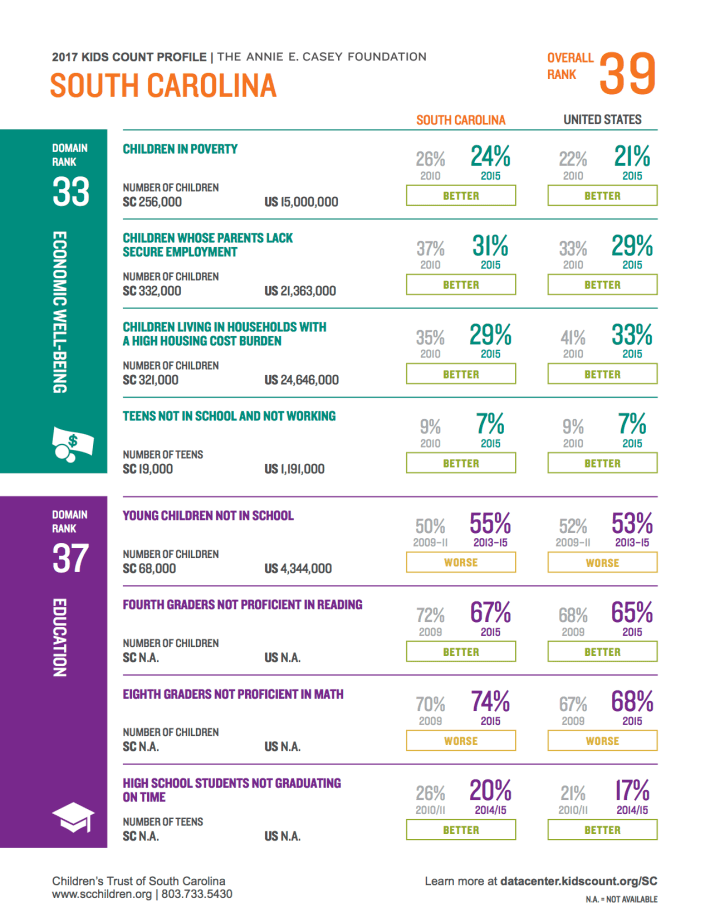With South Carolina showing progress in the KIDS COUNT annual rankings, Lakesha Fields, the child well-being coordinator at Children’s Trust, explains what the numbers mean and what can be done to keep improving the lives of children in our state.
The KIDS COUNT project of the Annie E. Casey Foundation releases its state rankings every summer on child well-being based on indicators of family and community stability, health, education, and economy. This year South Carolina ranked No. 39, and that feels like a celebration when our state has spent the previous 27 years floating around the 40s.
It also feels like we might just be getting a toehold on making real, positive change for South Carolina’s children and families. Since 2010 the state has seen a 23 percent decrease in the number of students not graduating high school on time and a 14 percent decline in the number of children whose head of household lacks a high school diploma.
Despite this progress, when you look more closely at the trends and raw data, you realize that we have only just begun what is a very long journey.
Far too many children still don’t have access to opportunity and clear pathways to success. For example, more than a quarter of a million children in South Carolina live in poverty and more than 150,000 of those live in high-poverty areas, defined as a census tract where more than 30 percent of the population is living below the poverty line. They face worse health outcomes, higher rates of crime and violence, and limited access to networks and job opportunities.
Living in poverty means many children may not have enough nutritious food to eat at home, and it is hard to learn when your stomach is empty. A child also might be living in a crowded housing situation, which means that there may not be a quiet place to do homework or a comfortable place to sleep.
Families who are poor and live in high-poverty neighborhoods may not be able to afford to send their children to pre-K. That means these kids start their academic journeys from a disadvantaged position. We know that 55 percent of South Carolina’s young children are still not in school.
As we read through the report and look at the trends over time, we find there are some clear takeaways:
- Investments in prevention and use of proactive economic support policies ensure a brighter future for South Carolina’s children and families. Efforts like the recently passed state Earned Income Tax Credit (EITC) will help. The EITC was a part of the roads bill (H. 3516), and it allows working families to better meet their needs and foster safer and more secure environments to raise children. Tax credit programs like these create economic stability and have served as lifelines for working families in 26 other states.
- Strong investment in the first few years of development can position a child for success in school and later life. Initiatives in our state such as the Early Childhood Common Agenda (ECCA) – led by Children’s Trust, Institute for Child Success and the United Way Association of South Carolina – provide a framework for policy makers to support quality early care and economic stability for working families with a goal of building a comprehensive early childhood system that serves all families.
Later this summer, Children’s Trust will release 2017 KIDS COUNT county-level data profiles. Mirroring the report released in June, these profiles will highlight outcomes in all of South Carolina’s 46 counties, ranking them based on KIDS COUNT indicators. These are a valuable tool for community leaders to identify local solutions that work alongside statewide initiatives to better support children and their families.
Moreover, we cannot have a conversation about child well-being in South Carolina without recognizing that outcomes for children of color show them significantly behind their peers. It is imperative that we improve their prospects because these children of color, along with their families, disproportionally face obstacles on the pathway to opportunity. Later this year, KIDS COUNT will be publishing a follow-up report to its groundbreaking 2014 Race for Results Index. This report will show how children of color are progressing on key milestones in education, health, economic well-being, and family and community.
It is important for all stakeholders in South Carolina – policy makers, business owners and general residents – to become familiar with the 2017 KIDS COUNT Data Book and 2017 Race for Results report.
When we invest in the health and education of our youngest citizens, we ensure they have the opportunity to become strong, healthy, educated, and productive in their adult lives. These young people are the future of our state. Making a commitment to their well-being today is an investment on a stronger and more competitive South Carolina.





